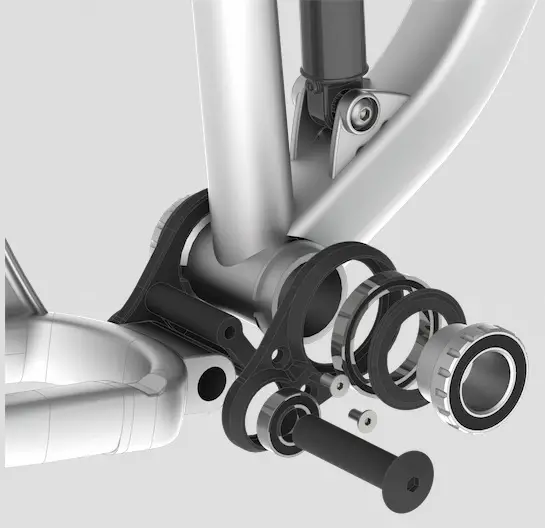German brand Silverback has just announced two new full suspension mountain bikes that are designed around their unique IDS REVO suspension platform. The Slider is a long-travel trail bike built with 27.5in wheels, and it features 140mm of travel up front with 135mm of travel out back. The Sprada is more of a 29in XC/Trail bike, with 120mm of travel up front and 110mm rear travel. Travel and wheelsize aside, Silverback claims that both bike offer excellent pedalling attributes courtesy of the IDS REVO linkage. Let’s have a gander at what they’re all about then shall we?

This guy here is the long-travel Slider. From the looks of things, it’s a high mileage trail bike with geometry that leans towards upright pedalling efficiency rather than full-blown downhill shreddage. It’s available in two different spec levels, though both bikes share the same alloy frameset.
- 27.5in wheels
- Rear travel: 135mm
- Fork travel: 140mm
- Hydroformed 6061 Alloy tubing
- Tapered head tube
- Oversized sealed cartridge pivot bearings
- 68.5-degree head angle
- 435mm chainstays
- 142x12mm thru-axle dropouts
- External full-length cable routing
- Sizes: Small, Medium, Large

Standing for “Intelligent Design System”, the IDS REVO suspension design utilises a similar platform to other virtual pivot point systems, such as the dw-link and Maestro designs. It features a solid front triangle, a solid rear triangle, and two mini-links that attach the two together. The difference with the IDS REVO platform though is in the lower linkage. Rather than pivoting off the back of the seat tube (like a Turner or Pivot frame does), the lower linkage rotates around the bottom bracket shell.
Other manufacturers have used concentric BB pivots in the past, including Kona with their A Frame, and more recently, Specialized with their latest Demo downhill race bike. But most of those frames are either single-pivot or four-bar designs. The only other company we can think of that utilises a similar dual-link suspension design with the lower link rotating around the BB shell is Finnish company, Pole. Regardless, it’s certainly an uncommon design. So what’s it meant to achieve?
“The Slider features the IDS REVO Suspension System. IDS is Silverback’s unique trail suspension technology. What makes this system different is that it uses a lower linkage that is concentric to the bottom bracket. This linkage uses large cartridge bearings to create a stiff and strong attachment point for the rear triangle. The system also uses a relatively high anti squat value that is optimised to complement dual and single chainring setups ensuring that power transfer remains efficient and direct. The upper linkage design creates a progressive leverage ratio that results in great small bump sensitivity as well as large impact absorption.” – Silverback Bikes

Got it? Well if not, here’s the shortened version: IDS REVO is basically designed to minimise pedal bob. It features a virtual pivot point that moves throughout the travel, starting quite high initially, then moving towards the BB near the end of the travel. The idea is to deliver plenty of anti-squat for firm pedalling to begin with, but not so much in the latter part of the travel that you get kickback (chain-tug) at the pedals. It sounds convincing, but we’ll need trail time to see how if it lives up to the claims.


The Sprada is built around the same IDS REVO suspension platform as the Slider, but it uses 29in wheels and less travel for more of an XC-Trail vibe. The Slider’s geometry definitely errs on the conservative side when compared to contemporaries such as the Kona Process 111 and the Whyte T-129, but as we all know, numbers on paper only tell part of the story. If the IDS Revo design lives up to its claims, the Sprada could be quite the mile-munching marathon machine.
- 29in wheels
- Rear travel: 110mm
- Fork travel: 120mm
- Hydroformed 6061 Alloy tubing
- Tapered head tube
- Oversized sealed cartridge pivot bearings
- 70-degree head angle
- 445mm chainstays
- 142x12mm thru-axle dropouts
- External full-length cable routing
- Sizes: Small, Medium, Large, X-Large

So what do you think of Silverback’s new Slider and Sprada models? If you’re looking to see the bikes in action, checkout Silverback’s launch video here, which gives a good explanation of how the IDS REVO suspension design works on the trail. You’ll have to excuse the awkward script though…











Will it be possible to buy them or will they end up vaporware like the fatbike did?
Sounds like a pivoting version of Yeti’s sliding link. See if you guys can get a test bike.
Words under headline
But how does it work on the trail?…
Words in article
It sounds convincing, but we’ll need trail time to see how if it lives up to the claims.
Conclusion to first question – don’t know